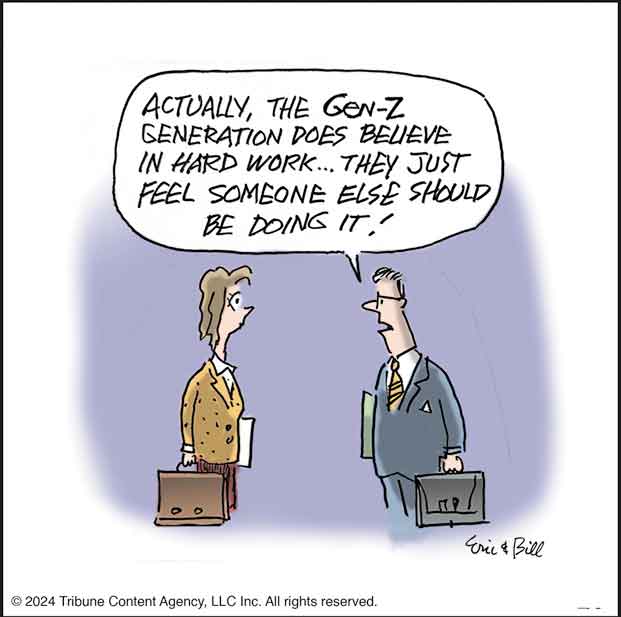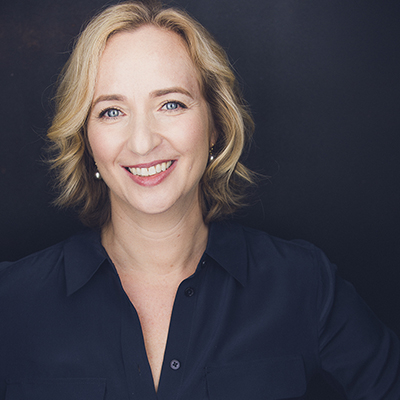
America has had a generation gap from the very start, and generational warfare for almost as long. But in at least one area, I believe a cease-fire is possible: We can end the war over which generation had it worse when they were young.
With soaring rents, high mortgage rates, student loans and a ballooning national debt to pay for entitlements, Generation Z and many younger millennials say they are getting a raw deal. Older Americans, meanwhile, are sick of all the whining from entitled young coworkers who they see as slackers.
The truth is somewhere in between. It is getting a little easier for young people, at least economically. But that does not take away from the fact that getting a start in the world is hard. All sides have a point — and we'd be better off if we had more realistic expectations for ourselves and empathy for each other.
In that spirit, and speaking as a very late Gen Xer — so late I don't feel part of any generation — here goes: If you grew up watching shows such as Friends, you might expect your 20s to be the best time of your life. You get a fun job in the city, a great apartment and close friends. And it's true that the first years of adulthood, free from responsibility and surrounded by your peers, is a special time. It is also a challenging time — and always has been.
It's not easy to establish a career. You don't have any skills yet — except if you're on the social media team, which wields a scary amount of power in every organization — so you are expendable, and must work many hours doing thankless tasks. But this is how you get good at what you do. It's how you learn an industry and make connections. I am not going to argue that it is a pleasant process, though technology has made it a little easier.
Young people complain about this state of affairs not only because it is genuinely unpleasant but because they have an exaggerated sense of their own worth. This is not unique to any generation. There always have been, and always will be, people who declare that they are opting out for an easier, lower paid career. Technology may give these people have a louder megaphone, but that doesn't necessarily mean there are more of them, or that they are representative of their generation. Sorting out who will be successful is never a fun process.
Being young usually means you also have no money. Even if you are lucky enough to have a professional-track job, you might be in an expensive city and have to live in a small apartment or a sketchy neighborhood or with bad roommates. (Of course, you could decide to forgo adulthood and live with your parents, but that comes with its own set of problems.)
It is also true that Gen Z faces difficulties other generations didn't. The US economy and culture put a premium on living in a big metropolitan area, at least when you are learning a trade and finding a partner. This may explain why living in big cities has become more common despite their higher cost of housing. Wages are also higher in cities, though not high enough.
At the same time, it's worth pointing out that earlier generations weren't living like the characters on Friends, either. Young adulthood has always been a financial struggle. In fact, despite today's high rents, today's young people have more savings than their predecessors. And while they have more student-loan debt, they also have higher and faster-growing wages — because they had more education.
Also worth remembering: Living in a city is fun and makes a prolonged adolescence possible. Those good times may be why older people tend to assume young people have it easy. They tend to forget that people in their 20s are free from many of the responsibilities and hardships of adulthood, but also have anxieties about their careers, relationships and money. Romanticizing this time of life does no one any favors.
I spent most of my 20s convinced I should be having more fun than I was, and feeling utterly inadequate as a result. I can't imagine how much worse it must be today, with social media constantly reminding you how much better your life should be.
So my advice and wish for the kids today — I use the phrase affectionately! — is this: Every phase of life has its pleasures and its challenges. I have confidence you will make it through these anxious years. And I hope that you will grow old enough to complain about the ingratitude and laziness of the younger generation.
(COMMENT, BELOW)
Allison Schrager, a Bloomberg columnist, is a senior fellow at the Manhattan Institute and a contributing editor of City Journal.
Previously:
• The 4-day work week is coming ... decades from now
• What's bad for Harvard is good for America
• America is no longer raising a nation of risk-takers
• Private equity won't diversify your portfolio
• The era of declining interest rates may have come to an end, and many investors don't seem to realize it
• This one weird trick could save the U.S. economy
• The Fed's damage to the housing market may last years
• The future of unions looks very different
• To bring back the office, bring back lunch
• Does it really matter who gets into Harvard?
• Our pensions shouldn't be used to juice the economy
• A soft landing won't mean the economy is safe
• The 30-year mortgage is saving the U.S. economy … or is it?
• The one true secret to successful investing
• Less work, more burn-out
• When did risk become a bad word in the U.S.?
• AI-proofing your career starts in college
• Biden has to learn the same lesson as SVB
• Say it with Rubio: Changing clocks is stupid
• Sure, we'll return to the office in 2023 but not to stores
• How to manage the biggest risk of all: Uncertainty
• If you think U.S. pensions are safe, just wait
• Harry and Meghan and the perils of superstar culture
• Norman Rockwell's economy is never coming back
• Burned by crypto? Don't learn the wrong lesson
• Quiet Quitters are looking in the wrong place for meaningful work
• America's MBAs are the latest skeptics of capitalism
• Generation Z is getting a harsh lesson in stock risk
• The biggest threat to the U.S. economy is policymakers
• Buck up, boomers. You're still better off than your parents
• How to manage the biggest risk of all: uncertainty
• Startup boom is the kind of risk-taking Americans need
• Gen Z is too compliant to achieve greatness
• A bigger child tax credit isn't the poverty solution we need
• Finding your power in a higher-priced world
• The Biden administration's plans to double the tax rate on capital gains will prove costly to all Americans, not just the wealthy
• WARNING: Feel Good Now --- Pay Later: Stimulus is crammed with goodies but makes no economic sense
• The 'Stakeholder' Fallacy: Joe Biden's vision of capitalism is a recipe for failure


 Contact The Editor
Contact The Editor
 Articles By This Author
Articles By This Author